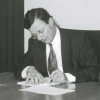Nederlandse akkoorden in 2000 over Joodse oorlogstegoeden
DOI:
https://doi.org/10.18352/bmgn-lchr.10103Keywords:
Jews.c Holocaust, Cultural history, Social work, Second World WarAbstract
Dutch Agreements about War Losses of Jewish Property in 2000
In 2000 agreements were reached in the Netherlands about Jewish Second World War assets. The Dutch restitution period after World War II had long been closed, but new windows of opportunity were offered in the nineties. As a result, the Dutch Jewish community made agreements with the Dutch insurance companies, government, banks and the stock exchange. These agreements have received international recognition. In this article notions from the Transitional Justiceliterature are used to analyse what happened in the renewed restitution process of the Netherlands. The Dutch case exemplifies how the concepts restitution, compensation and satisfaction can be valuable and applicable, hereby helping to illustrate how new ideas about law and justice concerning the Jewish World War II assets have prevailed since 2000.
In 2000 worden er in Nederland akkoorden gesloten over Joodse oorlogstegoeden. Waar het naoorlogse rechtsherstel in strikt juridische zin afgesloten is, worden alsnog openingen geboden om tot correcties en aanvullingen te komen. Vertegenwoordigers van de Nederlands Joodse gemeenschap sluiten akkoorden met de verzekeraars, de regering, de banken en de beurs. Deze akkoorden worden internationaal erkend. Om deze akkoorden te begrijpen, zijn begrippen
en theorieën ontleend aan Transitional Justice behulpzaam. Het ruime en ambigue begrip ‘reparations’ kan gebruikt worden om de uitkomsten van het Nederlandse restitutieproces te waarderen. ‘Reparations’ omvat restitutie, compensatie en het aanbieden van excuses. De Nederlandse casus onderstreept dat deze begrippen van praktische betekenis kunnen zijn. Zo laten deze begrippen zien dat nieuwe inzichten over recht en rechtvaardigheid gaan gelden over de Joodse oorlogstegoeden.
Downloads

Published
Issue
Section
License
Authors who publish with this journal agree to the following terms:
a) Authors retain copyright and grant the journal right of first publication with the work simultaneously licensed under a Creative Commons Attribution 4.0 International (CC BY 4.0) that allows others to share the work with an acknowledgement of the work's authorship and initial publication in this journal.
b) Authors are able to enter into separate, additional contractual arrangements for the non-exclusive distribution of the journal's published version of the work (e.g., post it to an institutional repository or publish it in a book), with an acknowledgement of its initial publication in this journal.
c) Authors are permitted to post their work online (e.g., in institutional repositories or on their website) prior to and during the submission process.
Authors are explicitly encouraged to deposit their published article in their institutional repository.








